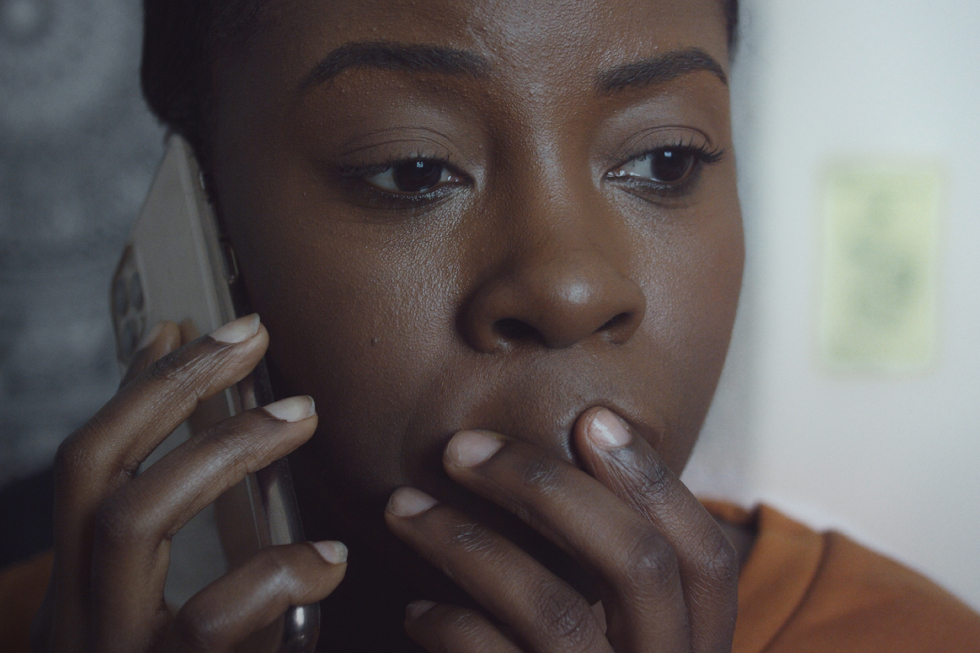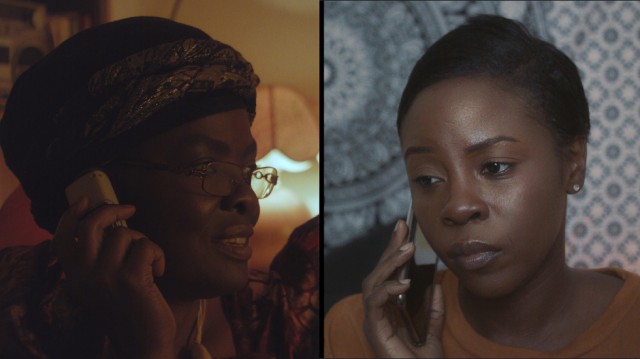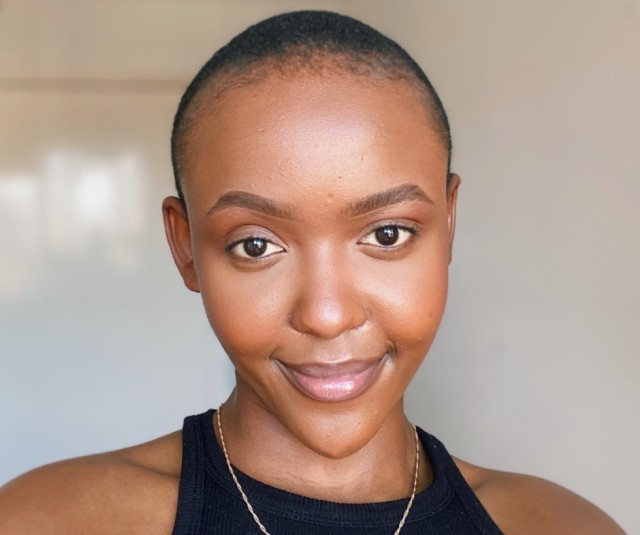“There’s a certain closeness and intimacy that comes with a shared tongue” – A Conversation With Filmmaker Cassandra Kyeyune

Cassandra Kyeyune is an exciting, emerging filmmaker who has recently debuted her short film Owulide on BBC Arts as part of the New Creatives programme. Here, Cassandra talks to Yasmin Ali about the film, whose title loosely translates as ‘have you heard?’, and the inspirations that led her to making it…
The Double Negative: Your film Owulide depicts a conversation between Rita and her Grandmother Jajja. In it, Rita wants to share her feelings, but is prevented by being unable to speak her native tongue, Luganda. What made you want to want to share such an intimate, internal struggle that many first- and second-generation immigrants deal with?
Cassandra Kyeyune: I’m going to be honest, it’s always been a massive frustration of mine, receptive bilingualism. Being able to understand every single word of my language but not being able to speak it fluently. Knowing that and what that does to relationships you have with your elders, particularly being part of the diaspora, it’s hard.
I went to Uganda about a year and a bit ago. It was so interesting to see the relationship that my cousins had with the older generations, as opposed to me who didn’t speak Luganda, the native language. There’s a certain type of closeness and intimacy that comes with a shared tongue. You realise there is a sense of emotion and certain words that can’t be easily translated to English. So seeing their relationship in juxtaposition to mine, I became intrigued by how that level of distance could be replicated in film – not just in terms of land, but also language.
TDN: You were able to explore this concept through the experimental New Creatives programme which resulted in the film being showcased on BBC Arts. How did this process differ to the films you’ve made in the past?
CK: My previous films have been more visual, monologue pieces. This was my first time writing dialogue between characters for screen so it feels like it’s a debut film in a way. I saw the callout for New Creatives and I had a loose idea for the film in my mind but I hadn’t really worked it out yet. So I guess I applied so I could figure out what it looked like.
I was approached by ICA London who run the programme. They said one of their production partners, NTS Radio, had seen my pitch and were interested in it. Things moved very quickly from that point on because we didn’t know if things would get worse, COVID wise. So I started that process of writing the script and approaching all aspects of the project to make it right. All my previous content was made with my mates, too, so it was interesting learning about production partners and the pitching process.

TDN: There’s a moment in the film where there is a switch in the lighting and camera angle. All of a sudden, Rita says what she wanted to get off her chest, but we realise this is an alternate reality of a world where she can communicate intimately and says what she wanted to say all along. Talk us through the stylistic decisions made here.
CK: That was tricky for me because how do you convey to the audience, who are largely English native speakers or who are not Luganda speakers, that Rita is struggling to communicate? As the audience who may not speak the language, it’s hard to realise that grammatically, a lot of the stuff she is saying is wrong. Whereas, if somebody is Ugandan, they’ll realise quite quickly that she is not a good speaker.
I wanted to portray Rita kind of going into her head and saying all the things she wishes she could say to her grandma. We used a purple hue to emulate a dream-like state, or Rita’s subconscious state, finally saying what she really meant. And when she comes out of that, she goes back to the original side-by-side frame with her grandmother on the phone.
I think I was overthinking that moment and how to show it. I was quite honest with my team and told them I wasn’t sure how to approach it, so everyone was really helpful, pitching in like “how about this, how about that?” and we used a few different lighting setups. So working collaboratively always helps in times like that.

TDN: What or who are your inspirations for your work?
CK: I think one of my biggest inspirations creatively growing up was [singer songwriter] Lauryn Hill. Her work made me feel seen quite early on, I was like, “Oh my god, it’s like she knows what I think in my head!” The honesty of her work meant a lot when I was younger. I also grew up on Nollywood films. Every weekend, all my aunties would come to my house and that’s what we would watch with the family.
In terms of a film that has been inspiring as of late, The Farewell is phenomenal. [Its director] Lulu Wang captures quite a unique cultural and singular experience but, in a way, it feels so universal that I can see myself in the relationship between the characters Billi and Nai Nai. The way the dialogue was approached was just perfect. I love films that capture me and capture the nuances in the everyday, it’s quite sublime. Barry Jenkins (Moonlight) is another one. I think his work is phenomenal and he tells stories that feel really, really personal, and he portrays really intimate points in people’s lives.
Above all else, though, the matriarchs in my life are the biggest inspirations I have – my mum, my aunties. I really want to continue telling stories where women like them are the front and centre, where they’re actually the main characters, it’s their show, they are running things.
I essentially grew up at their feet. Their stories are the ones that have inspired me because they are the ultimate storytellers and they’ve perhaps not had the opportunity to tell their stories in film or in the same way that a white heterosexual man has had the privilege of doing. My gosh, what a wealth of stories these women have! And I’ve had the great privilege of hearing them whilst I was growing up.
TDN: Do you feel like you have a responsibility to them, to yourself or your culture to share these stories, particularly in film?
CK: Definitely. Especially if the stories are from a culture that hasn’t been given as much prominence. You do have a responsibility, but you have to ask yourself, “am I the right person to tell this story?” and then you want to work with people who you feel aligned with in your values.
In making Owulide, and this whole journey in particular, it’s shown me that filmmaking full time feels feasible for me. The more I do it, the more I feel like there is still so much I want to say. There are so many iterations of the same story I want to tell. Film provides you with the opportunity to do that. You’re almost creating worlds that people can fall into and see elements of themselves in.
In the film, Rita and Jajja’s conversation ends abruptly when the calling card runs out. It’s not the perfect ending but there is a level of hope to it, particularly for kids in the diaspora who struggle to forge meaningful, substantial relationships with family ‘back home’, that there is a closeness to be found. It’s not going to be perfect, but Rita reached out her hand, and her grandma took it.
That’s hopefully what I want people to take from this film and my other work: we are different but there are lessons to be learned and similarities to be found.
Yasmin Ali
This article is part of the series Next Chapter, a new writing project in partnership with Writing on the Wall, to nurture and publish new voices.
Images, from top: Owulide film still; Owulide film still; Cassandra Kyeyune portrait





